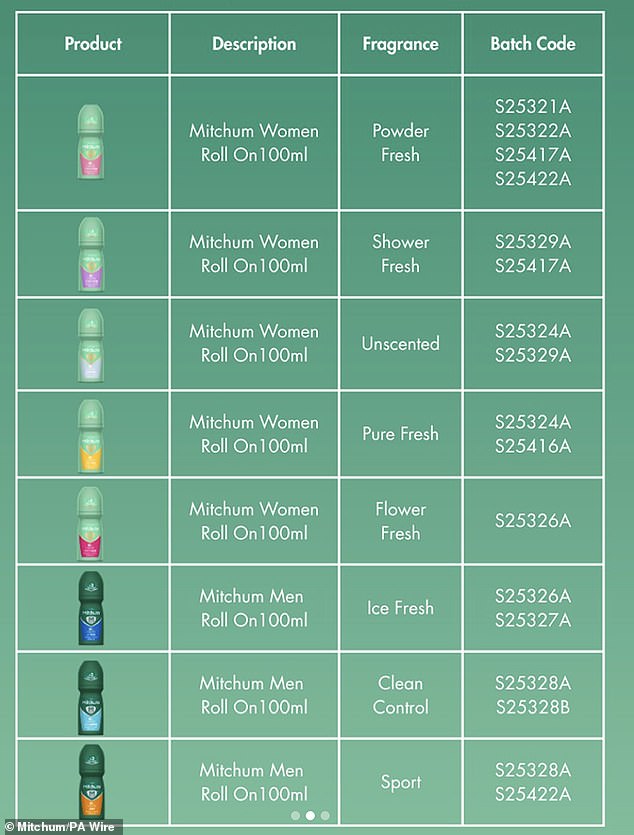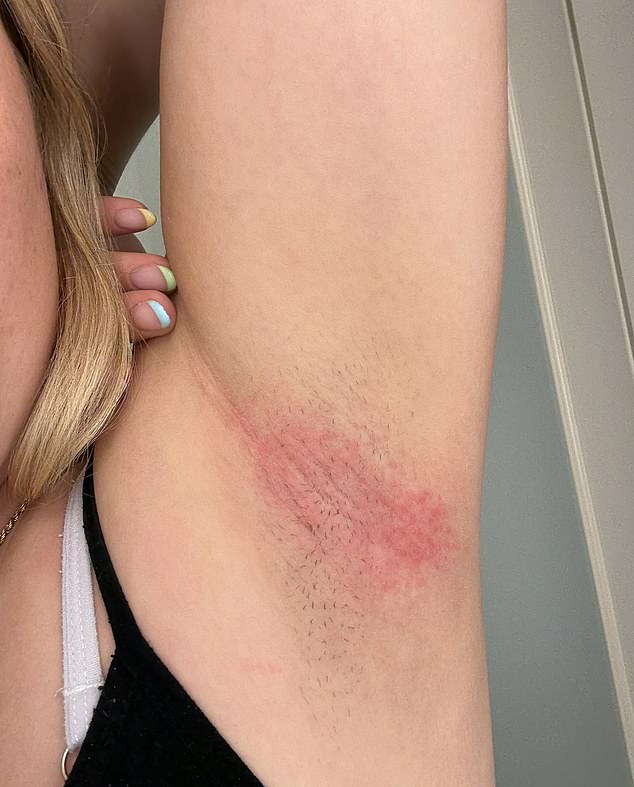Popular deodorant brand Mitchum’s was today rocked by fresh complaints, after men claimed to have been left in excruciating pain after using the products.
Earlier this week, hundreds of women took to social media warning they had suddenly developed ‘agonising’ rashes and burns from the brand’s roll-on deodorants, with some even requiring creams and antibiotics.
Pictures showing sore red armpits have flooded online forums and TikTok, with users left in tears by the angry red welts which are spreading over their skin.
But men have now told the Daily Mail they too have required medical grade creams to treat the painful rashes and burning they suffered using the deodorants—one even claimed to have lost all his armpit hair.
Mitchum have issued a statement via Instagram apologising to customers and claimed ‘a change in the manufacturing process of one of our raw materials altered how the product interacts with the skin in some consumers’.
‘We are sorry to those who were impacted and for the time it took to complete the investigation,’ it added.
Experts, however, told the Daily Mail they were shocked the painful side effects were not discovered earlier.
One man, Ricky Blair from Ipswich, Suffolk claimed he bought one of the affected roll on deodorant’s in July.

In one TikTok video seen hundreds of times, London-based theatre actor Marc Antolin, also said: ‘I have been a Mitchum user for years’
But just an hour after applying the new product as normal, the 35-year-old developed a rash, ‘agonising’ burning sensation and itch.
‘I’ve used Mitchum for years, it’s been a really good product so I had no idea it was the deodorant at fault,’ he told the Daily Mail.
‘I ended up having to use an emollient cream for a whole week to treat the itchiness and calm the burning rash.
‘I’ve seen a lot of videos over the last couple of days of women sharing the issues they’ve had with the new reformulated product but I want to make people aware it can happen to men too.
‘It’s something that men should look out for.
I’ve stopped using Mitchum completely, I won’t be using the brand for a long long time.’
In one TikTok video seen hundreds of times, London-based theatre actor Marc Antolin, also said: ‘I have been a Mitchum user for years.’
Holding up one the brand’s ‘clean control’ roll-on deodorant’s he added: ‘I had one of the new batches with the change in ingredients and I got a reaction to it.

Men have now told the Daily Mail they too have required medical grade creams to treat the painful rashes and burning they suffered using the deodorants—one even claimed to have lost all his armpit hair (pictured)

Mitchum have issued a statement via Instagram apologising to customers and claimed ‘a change in the manufacturing process of one of our raw materials altered how the product interacts with the skin in some consumers’
‘It was painful. I sweat a lot, especially during shows, and I don’t know what the alternative is to this deodorant.’
David, from Surrey, meanwhile, told the Daily Mail he suffered a reaction over three years ago in 2022 after using Mitchum’s ‘Ice fresh’ Men’s Ultra Powerful Anti-Sweat roll-on deodorant.
‘I had the product less than a month. It burnt both armpits, it took all the hair off and I had a lot of hair under my arms. It’s never grown back again,’ the 73-year-old solicitor told the Daily Mail.
‘It was the first time I’d used the deodorant because my normal brand was difficult to get hold of.
‘I thought perhaps it was something wrong with me at the time, because I hadn’t heard of anyone else experiencing the same side effects.
‘After I’d apply it, I’d feel a burn and it got worse, the whole of the armpit went completely red,’ he claimed.
‘I have a lot of hair on my body and had a lot of hair under my armpits.
‘I was concerned that this burning ingredient had gone through my skin,’ he claimed.

Some users were left with an angry red rash
‘As soon as I stopped using it, the burning and rash stopped.’
Experts have suggested that the burning, itchy armpits may be due to two specific new ingredients in the eight affected products.
Professor Penny Ward, a pharmaceutical expert at King’s College London, told the Daily Mail: ‘The contents of the “new” format includes acetyl cedrene which has been shown to be an irritant in patch testing as well as vanillin which can also be a skin irritant in some individuals.
‘Generally the irritant chemicals are most likely to be those which are the added fragrances.
‘In general most dermatitis rashes are itchy rather than painful, pain might be an indication of infection and might need treatment with an antibiotic or antifungal cream.
‘If one develops a reaction to a topical product its a good idea to stop using it and switch to something else-after the rash has settled.
‘Occasionally it may need to be settled down with a topical antihistamine or corticosteroid cream which can be obtained with pharmacy advice.’
But she also added: ‘For a pharmaceutical product, any changes made to the manufacturing methods have to be qualified and the product has to be demonstrated to be safe and effective with appropriate pre clinical and clinical tests.
‘I am surprised that this side effect was not picked up as part of the validation process.
‘The rules for cosmetics are not so stringent, although they are being strengthened by regulators.
‘Manufacturers may in future need to demonstrate that manufacturing changes do not impact the safety of the final product in a similar manner to a pharmaceutical product.’
One Danish study recently found that deodorants were the leading cause of fragrance allergy, especially for men.
Irritant contact dermatitis is the most common type of contact dermatitis.
It occurs when a substance damages or inflames the skin. It typically develops at the first sign of contact between the skin and irritating substance.
Irritant contact dermatitis can be easier to identify because symptoms usually arise immediately, causing stinging or discomfort.
Allergic contact dermatitis is a delayed allergic reaction that appears as a rash a day or two after skin is exposed to the allergen.
It is caused by the body mounting an inflammatory response to a specific ingredient.
With repeated use, your immune system recognises the substance as an allergen, and it causes an itchy skin response.












